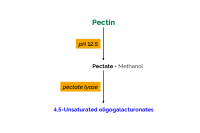500 assays per kit
Prices exclude VAT
Available for shipping
| Content: | 500 assays per kit |
| Shipping Temperature: | Ambient |
| Storage Temperature: | Short term stability: Ambient, Long term stability: See individual component labels |
| Stability: | > 2 years under recommended storage conditions |
| Analyte: | Pectin |
| Assay Format: | Spectrophotometer |
| Detection Method: | Absorbance |
| Wavelength (nm): | 235 |
| Signal Response: | Increase |
| Reaction Time (min): | ~ 30 min |
| Application examples: | Food ingredients (e.g. citrus fruit and apple) and other materials. |
The Pectin Identification Assay Kit is suitable for the identification of pectin in food ingredients. This kit now employs a new pectate lyase from Aspergillus niger.
See the complete list of our polysaccharide assay kit products.

- Very cost effective
- All reagents stable for > 2 years after preparation
- Only enzymatic kit available
- Simple format
- Standard included
A combination of commercial and traditional food-source-derived enzymatic treatment acts as a potential tool to produce functional yuzu (Citrus junos) powder.
Jeong, H., Das, P. R., Kim, H., Im, A. E., Lee, B. B., Yang, K. Y. & Nam, S. H. (2023). Food Chemistry: X, 20, 100918.
Enzymatic modifications have been applied in citrus to enhance their physicochemical and biological properties and reduce their bitterness. Notwithstanding, research on the combination of enzyme treatment of yuzu is lacking. In this study, yuzu was treated with a combination of isolated cellulase NY203, pectinase UF, and cellulase KN, and this enzymatic treatment was found to increase monosaccharide, naringenin, and hesperetin levels. In contrast, dietary fiber, cellulose, hemicellulose, lignin, and pectin levels were decreased. Moreover, the enzymes disintegrated the inner and outer surface structures and chemical bonding of yuzu, thus improving its solubility rate, water-holding capacity, oil-adsorption capacity, cholesterol-binding capacity, and water-swelling capacity. Furthermore, NY203 + UF + KN combination treatment reduced the bitterness of treated yuzu by 50 % compared with the control. Additionally, NY203 + UF + KN treatment yielded a 28 % decrease in lipid accumulation and two-fold higher lipolytic activity in 3T3L-1 adipocytes. These findings are potentially beneficial to the food/nutraceutical industries regarding functional yuzu powder production.
Hide AbstractMulti‐block analysis for the correlation of physico‐chemical and rheological data of 42 fruit pulps.
Stafussa, A. P., Rampazzo, V., Fernandes, R. R., Franco, A. T., Bona, E., Maciel, G. M. & Haminiuk, C. W. I. (2019). Journal of texture studies, 50(2), 114-123.
The common dimension (ComDim) chemometric method for multi‐block analysis and hierarchical cluster analysis (HCA) were used to evaluate the data obtained from the physico‐chemical and rheological characterization of 42 commercial fruit pulps. The physico‐chemical characteristics and the rheological behavior of the pulps were found to be considerably different. The Herschel-Bulkley equation was fit to the steady‐state flow curves of the fruit pulps, and it was found to appropriately describe the materials, which showed a wide range of yield stresses. The soluble solids content and the yield stress were the main factors responsible for the sample discrimination in the multivariate statistical analysis. The ComDim model indicates that these parameters may have a direct correlation. Namely, the soluble solids amount can influence the viscosity, as demonstrated by the similar scores of the samples in both common components, and this corroborated with the HCA analysis.
Hide AbstractUdeh, C. B., Ameh, J. B., Ado, S. A. & Okoduwa, S. I. R. (2017). Journal of Biotechnology Research, 3(3), 15-24.
Background: In the present study, optimized cultural conditions for enhanced production of xylanase from local soil isolate of Trichoderma species, using water hyacinth as a substrate in submerged culture fermentation is presented. Method: The Megazyme assay method was used for endo 1, 4-β-xylanase using Azo-xylan (Birchwood). Results: A continuous increase in xylanase production was observed with increasing level of substrate concentration in the medium and highest production was obtained with water hyacinth at 6% w/v level. Maximum xylanase production was achieved with a pH 5.0, incubation temperature of 30°C and agitation rate of 150 rpm. The highest production was achieved on day five of fermentation at optimum parameters under study. Conclusion: The study showed that production of xylanase can be cost effective using water hyacinth and can be implored on large scale for industrial applications.
Hide Abstract






















